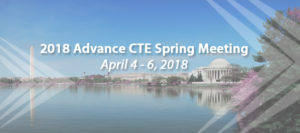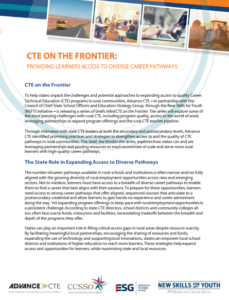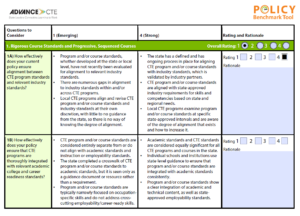TWEET OF THE WEEK
A6: Everything I’ve learned in my CTSO is GREAT! I’ve learned how to lead diversely, how to create meaningful connections, public speaking, & SO MUCH MORE! Participating in a CTSO gives us opportunities to do things others don’t do until they are in their careers! #CTSOChat
— Bruna Tavares (@tavaresdbruna) February 8, 2018
RESOURCES OF THE WEEK
Join the CTE: Learning that works for America campaign to get the word out about CTE in your community! Joining the brand gives you access to the national and state logos, in addition to a variety of new tools and resources. Check out our guide for putting the campaign into action, and check out our tips on how to celebrate CTE Month.
REPORT OF THE WEEK
Not only is it CTE Month, it’s also School Counselors Week! To better understand the connection between CTE and school counseling, we conducted research and released a report with the American School Counseling Association. The report finds that, across the board, states are not overly confident in the effectiveness of their career advising and development systems. Fifty-eight percent believe they are only somewhat effectively serving K-12 students, and 55 percent believe they are either only somewhat effective or not effective at serving postsecondary CTE students. And while school counselors who connect students with CTE coursework and career pathways find it an effective career advising and development strategy, relatively few are able to make these connections.
How are you celebrating CTE Month? Let us know by sending an email to Katie at [email protected]
Katie Fitzgerald, Communications Manager



 expertise. Enhancing classroom instruction with industry experts can bring the real world into the classroom and blur the lines between education and the workplace. A successful example of this collaboration between education and the workforce can be found at our 2017 Excellence in Action award winner in the
expertise. Enhancing classroom instruction with industry experts can bring the real world into the classroom and blur the lines between education and the workplace. A successful example of this collaboration between education and the workforce can be found at our 2017 Excellence in Action award winner in the 


 State leaders can use the
State leaders can use the  nts at Tolsia High School in West Virginia have created an industry-validated carpentry business within their classroom. Students at Haynesville Junior/Senior High School in Louisiana are connected with physical therapists, diesel mechanics, a marriage and family counselor and other industry professionals on a biweekly basis through virtual “micro-industry engagements.” In North Dakota, nursing students can earn their associate’s degree through one of four community colleges, while taking their classes at rural hospitals and health care facilities. And in Montana, a mobile laboratory is deployed across the state to engage students around various career opportunities.
nts at Tolsia High School in West Virginia have created an industry-validated carpentry business within their classroom. Students at Haynesville Junior/Senior High School in Louisiana are connected with physical therapists, diesel mechanics, a marriage and family counselor and other industry professionals on a biweekly basis through virtual “micro-industry engagements.” In North Dakota, nursing students can earn their associate’s degree through one of four community colleges, while taking their classes at rural hospitals and health care facilities. And in Montana, a mobile laboratory is deployed across the state to engage students around various career opportunities. location, or a car repair garage in the suburbs, an incredible number of small businesses can be found almost everywhere. In fact, in a recent report from Business.com, “every minute, a new business is started in the U.S. and, according to some, more than 50 percent of all workers will be self-employed by 2020.” (The State of Small Business in America, 2015, Business.com, emphasis added.)
location, or a car repair garage in the suburbs, an incredible number of small businesses can be found almost everywhere. In fact, in a recent report from Business.com, “every minute, a new business is started in the U.S. and, according to some, more than 50 percent of all workers will be self-employed by 2020.” (The State of Small Business in America, 2015, Business.com, emphasis added.)